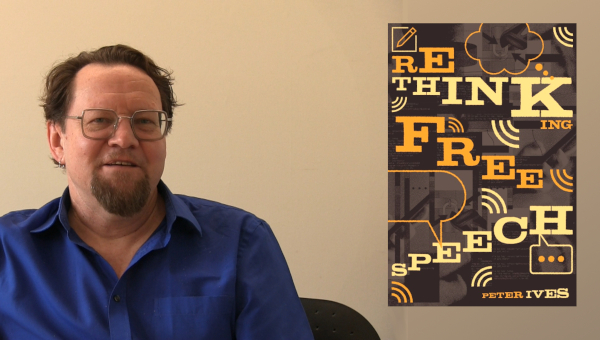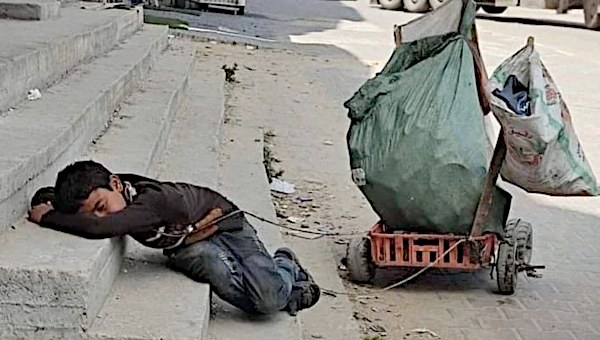The Dirt of Pretty Things in Dirty Pretty Things (2003)
Introduction: Dirty Pretty Capitalism
Dirty Pretty Things(2003), a film directed by Stephen Frears and written by Steven Knight, is a realist narrative set in the cosmopolitan global city-scape of London in the period following Thatcher’s neoliberal ascendancy. The film explores the black-market traffic of human body parts and labor, examines the struggles of documented and undocumented immigrant workers for a better life, and performs a subtle critique of social class relations in 21st century capitalism.
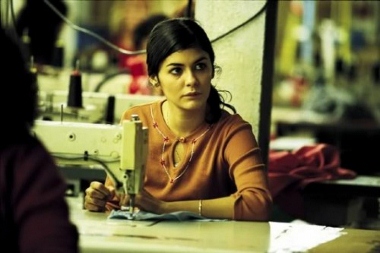 A brief synopsis of the film follows. Dirty Pretty Things’ protagonists are two immigrant workers. Okwe (Chiwetel Ejiofor) is a Nigerian doctor who works as a taxi-cab driver to make a living by day. At night and into the early morning, Okwe is a desk clerk at the Baltic Hotel. Senay (Audrey Tautou) is a Turkish Muslim woman who works as a chambermaid at the Baltic Hotel and as a machine operator in a garment sweatshop. After successfully dodging the state’s immigration officers with the help of Juliette (Sophie Okonedo), a prostitute, Ivan (Zlatko Buric), a Russian bellhop, and Guo Yi (Benedict Wong), an highly educated South Asian morgue attendant, Okwe and Senay reveal that Sneaky (Sergi Lopez), the manager of the Baltic Hotel, is trading fabricated citizenship passports to impoverished undocumented workers in exchange for their kidneys. Sneaky’s black market scheme of selling extracted immigrant kidneys to wealthy English consumers for a steep price is foiled by Okwe and Senay, who eventually gain two fabricated passports and then depart from London (and each other) toward uncertain and unpredictable futures.
A brief synopsis of the film follows. Dirty Pretty Things’ protagonists are two immigrant workers. Okwe (Chiwetel Ejiofor) is a Nigerian doctor who works as a taxi-cab driver to make a living by day. At night and into the early morning, Okwe is a desk clerk at the Baltic Hotel. Senay (Audrey Tautou) is a Turkish Muslim woman who works as a chambermaid at the Baltic Hotel and as a machine operator in a garment sweatshop. After successfully dodging the state’s immigration officers with the help of Juliette (Sophie Okonedo), a prostitute, Ivan (Zlatko Buric), a Russian bellhop, and Guo Yi (Benedict Wong), an highly educated South Asian morgue attendant, Okwe and Senay reveal that Sneaky (Sergi Lopez), the manager of the Baltic Hotel, is trading fabricated citizenship passports to impoverished undocumented workers in exchange for their kidneys. Sneaky’s black market scheme of selling extracted immigrant kidneys to wealthy English consumers for a steep price is foiled by Okwe and Senay, who eventually gain two fabricated passports and then depart from London (and each other) toward uncertain and unpredictable futures.
On first glance, the film’s title, Dirty Pretty Things, appears to be an oxymoron, the combination or alignment of contradictory terms. On closer examination of the film’s narrative and themes, however, the title’s articulation of “dirty” to “pretty” to “things” supports the film’s political effort to critique the fetishistic and reified social relations of service work in capitalism.
The Baltic Hotel: Fetishism, Reification and Service Work
According to historical materialists, social relations in capitalism are fetishistic and reified. They are fetishistic because the market’s circulation of commodities with exchange-values mystifies each commodity’s origin in human labor and masks the unequal terms of their production. They are reified because the market reduces the human capacity to think and act (labor) to an exchange-value, an object that can be sold, bought, and exploited. In the affluent “postmodern” societies and service-sector economies of North America and Western Europe, many ads, TV programs and films conceal the social relations of service production between people by constructing “the good life” as one defined solely by consumerism and representing human freedom as the right to enjoy services in free markets. Many media products obscure the social relations of immaterial commodity production in capitalism or simply normalize the hardships of service work as the way of the world.
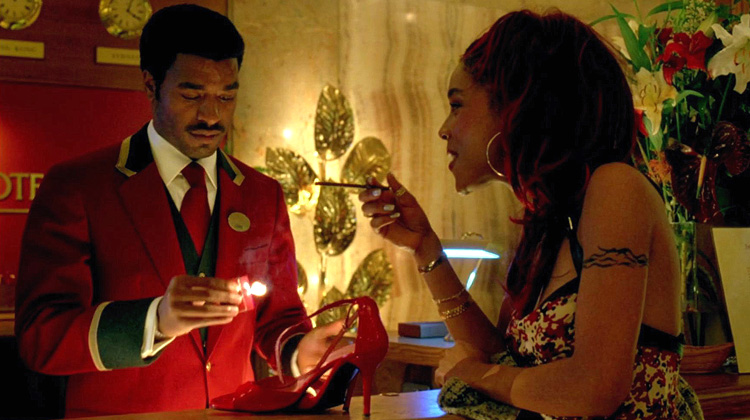 Dirty Pretty Things (DPT), however, presents viewers with a poignant critical view of the social relations of service work in capitalism. It is about the “dirty work” of the service economy, the unfree side of the global free market, and the social class divisions that underlie the production and delivery of all the world’s commodified “pretty things.” This critical theme is encapsulated by the Baltic Hotel’s customer service motto: “our guests leave dirty things, we make them pretty things.” Indeed, behind the pretty façade of the Baltic hotel—its delectable chocolate truffles, after-hours gourmet room service, crustless white bread, pristine rooms and clean white sheets—exist dirty capitalist relations of exploitation and oppression. Housemaids are intimidated by immigration officers, sex workers are beaten by wealthy white tourists, insomniac desk clerks fish devalued bloody organs out of flooding toilets while privileged patrons dine, relax, and sleep. By concentrating on the “dirt” of the service work labour process in a hotel and the class divisions between service managers, workers and tourist-consumers, DPT scrutinizes capitalist reality. The film reveals the “dirty” social reality of service-work that is often concealed by the “pretty” world of commodity exchange, market pleasure, and pre-packaged leisure. The narrative’s climax epitomizes the film’s attempt to reveal the dirt of capitalism’s pretty things. A wealthy English consumer who wants to purchase a kidney from Sneaky asks Okwe: “how come I never see you people?” Okwe responds: “because we are the people you don’t see. We drive your cabs, clean your rooms, and suck your cocks.”
Dirty Pretty Things (DPT), however, presents viewers with a poignant critical view of the social relations of service work in capitalism. It is about the “dirty work” of the service economy, the unfree side of the global free market, and the social class divisions that underlie the production and delivery of all the world’s commodified “pretty things.” This critical theme is encapsulated by the Baltic Hotel’s customer service motto: “our guests leave dirty things, we make them pretty things.” Indeed, behind the pretty façade of the Baltic hotel—its delectable chocolate truffles, after-hours gourmet room service, crustless white bread, pristine rooms and clean white sheets—exist dirty capitalist relations of exploitation and oppression. Housemaids are intimidated by immigration officers, sex workers are beaten by wealthy white tourists, insomniac desk clerks fish devalued bloody organs out of flooding toilets while privileged patrons dine, relax, and sleep. By concentrating on the “dirt” of the service work labour process in a hotel and the class divisions between service managers, workers and tourist-consumers, DPT scrutinizes capitalist reality. The film reveals the “dirty” social reality of service-work that is often concealed by the “pretty” world of commodity exchange, market pleasure, and pre-packaged leisure. The narrative’s climax epitomizes the film’s attempt to reveal the dirt of capitalism’s pretty things. A wealthy English consumer who wants to purchase a kidney from Sneaky asks Okwe: “how come I never see you people?” Okwe responds: “because we are the people you don’t see. We drive your cabs, clean your rooms, and suck your cocks.”
The global economy’s high-flyers may prefer not to see or think about the exploitation and oppression of those people who provide for their leisure, food, comforts and pleasures in creative cities. But DPT tries to show us this capitalist reality by focusing on the division of labor in a hotel, the sorrows of waged and unwaged work, and the reduction of humans to exchangeable objects that are circulated on (and consumed by) the market. Throughout DPT’s narrative, racialized and sexualized bodies (and body parts) are objectified as exchange-values and consumed by those who can pay. Flows of chamber maids are objectified by the panoptic gaze of hotel surveillance cameras as they enter the workspace. Immigrant children sweat it out for an Indian garment contractor in scenes that highlight the intersection of Northern and Southern commodity chains. The bodies of women are transformed into exchangeable sex-service commodities that get used up. Juliette, for example, is compelled to service any man that can pay while Senay is coerced into sexual services by Sneaky and the pig-like sweatshop owner. DPT’s most graphic display of the market’s transformation of humans into exchangeable objects occurs in scenes in which shady surgeons extract kidneys from immigrant worker bodies and dealers transform these kidneys into iced commodities ready for sale on the market. DPT’s representation of the production and consumption of immigrant labor (and body parts) by capitalism brings to mind Marx’s account of the market vampire: “the capitalist devours the labour-power of the workers and appropriates their living labor as the life-blood of capitalism.”
Agency, Class and Cultural Identity
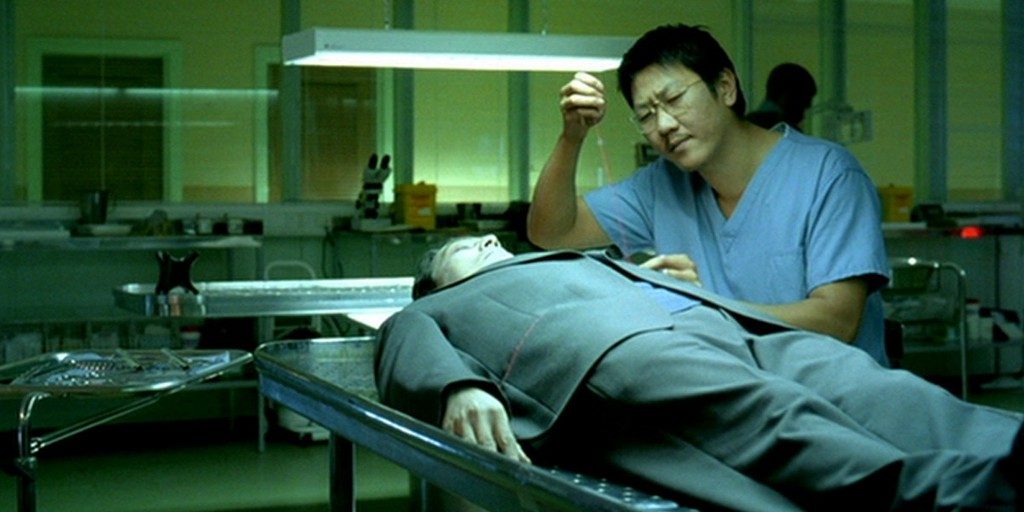 Though Dirty Pretty Things represents the brutalization of immigrant workers in a cosmopolitan city, it does not reduce its protagonist workers to passive victims, to pure ideological “effects” of dominant capitalist structures. Gou, reflecting on the mechanical and mind-numbing routine of work in the morgue, says: “A kidney for $10,000! For that some people take risks. If I had the courage, I would sell my kidney just to get out of here. Just to save my brain.” Here, Gou explains the choice to have one’s body mutilated and sold as an alternative to the sale of his labor-power for a wage and the alienating conditions of his waged work. Gou’s joking statement—and the kind of worker “agency” it implies—does not challenge the alienating structures of capitalist production that he is part of. But it destabilizes a view of the worker as only as passive object and inactive victim of capital. DPT represents workers as objects of capitalism and active subjects of capital. Their labour power is disposed and exploited; but they also make choices and struggle to transform their lives. In some scenes, DPT’s characters refuse to perform specific kinds of work and by refusing to work, they refuse to become (and ideologically reproduce) particular kinds of people. For example, Okwe refuses to work as Sneaky’s black market butcher qua “doctor”; this sabotages the productive capacities and efficiency of Sneaky’s operation. At the same time, Okwe refuses to become like Sneaky: a self-interested and individualized neoliberal subject that capitalizes on the plight and suffering of others. Okwe refuses to selfishly “will to power” and has a conscience of the wider consequences of his work. Likewise, Senay refuses to labor as the Indian sweatshop owner’s “whore” by “biting” his penis while being forced to perform oral sex. By doing so, Senay interrupts the smooth reproduction of the sweatshop’s operations and sabotages the power of its patriarchal controller. By challenging the morally bankrupt and ethically perverse business ventures of self-interested middle managers, by struggling to preserve and demonstrate some degree of control over their minds and bodies, Okwe and Senay labour within and against the capitalist structures and institutions that seek to reduce them to machines.
Though Dirty Pretty Things represents the brutalization of immigrant workers in a cosmopolitan city, it does not reduce its protagonist workers to passive victims, to pure ideological “effects” of dominant capitalist structures. Gou, reflecting on the mechanical and mind-numbing routine of work in the morgue, says: “A kidney for $10,000! For that some people take risks. If I had the courage, I would sell my kidney just to get out of here. Just to save my brain.” Here, Gou explains the choice to have one’s body mutilated and sold as an alternative to the sale of his labor-power for a wage and the alienating conditions of his waged work. Gou’s joking statement—and the kind of worker “agency” it implies—does not challenge the alienating structures of capitalist production that he is part of. But it destabilizes a view of the worker as only as passive object and inactive victim of capital. DPT represents workers as objects of capitalism and active subjects of capital. Their labour power is disposed and exploited; but they also make choices and struggle to transform their lives. In some scenes, DPT’s characters refuse to perform specific kinds of work and by refusing to work, they refuse to become (and ideologically reproduce) particular kinds of people. For example, Okwe refuses to work as Sneaky’s black market butcher qua “doctor”; this sabotages the productive capacities and efficiency of Sneaky’s operation. At the same time, Okwe refuses to become like Sneaky: a self-interested and individualized neoliberal subject that capitalizes on the plight and suffering of others. Okwe refuses to selfishly “will to power” and has a conscience of the wider consequences of his work. Likewise, Senay refuses to labor as the Indian sweatshop owner’s “whore” by “biting” his penis while being forced to perform oral sex. By doing so, Senay interrupts the smooth reproduction of the sweatshop’s operations and sabotages the power of its patriarchal controller. By challenging the morally bankrupt and ethically perverse business ventures of self-interested middle managers, by struggling to preserve and demonstrate some degree of control over their minds and bodies, Okwe and Senay labour within and against the capitalist structures and institutions that seek to reduce them to machines.
In Dirty Pretty Things, cultural identity both limits and enables each character’s agency and struggle. On first glance, cultural identities act as fetters on each character’s mobility, as disciplinary and ideological constructions that contribute to each character’s exploitation and oppression. Okwe, for example, is an ex-doctor who has been framed by the Nigerian state for murdering his wife; he is on the run from the Nigerian state and its construction of his identity. Senay is a Muslim woman says that “god no longer speaks to her”; she seeks to escape the limitations of her historically and religiously constructed identity. At the same time, Okwe and Senay are both racialized and classed as inferior “others” by the British security state and the wider neoliberal society. The governmental recognition of Okwe and Senay’s identities would not result in their acceptance or integration, but rather, their deportation, imprisonment, and in Okwe’s case, execution.
Identity is a cage that these characters wish to escape from. Okwe and Senay thus struggle against the constructions of their past cultural identities and seek to appropriate new ones in the form of fabricated citizenship passports. Okwe and Senay’s struggle for a new identity and their negotiation of the exploitative oppressive effects of the ones they inhabit is the underlying conflict that drives the narrative of DPT forward. In a capitalist and neoliberal state, cultural identity plays a role in each character’s subordination; but identity also a condition of possibility that motivates each character’s struggle to move toward a different future.
Class Solidarity and Culture
Though DPT stages moments of “ethno-cultural solidarity” between characters, it does not essentialize cultural identity or depict it as a basis for class solidarity. Okwe, for example, refuses to remove the kidney of a Nigerian woman, despite her attempt to hail him as her Nigerian “brother.” Rather than inhabiting the cultural identity constituted by the woman’s discourse (“Nigerian brother”), Okwe replies: “put on your clothes.” DPT depicts characters identifying and dis-identifying with the cultural identities constituted for them. DPT intimates that the most meaningful form of solidarity is not ethno-cultural, but economic.
Throughout the film, service workers empathize with each other’s common experience of selling labor-power and toiling in exploitative and oppressive environments. Characters identify with each other, not because they are Nigerian or Muslim or Russian or Spanish, but because they are workers, members of a service class vis-à-vis an expanding service economy. Labour is what brings all of these cultural identities together into the hotel’s sphere of production; it is what enables interaction and acts of solidarity. Okwe, for example, beats a John after he abuses his friend Juliette, a prostitute. Guo allows the homeless Okwe to sleep in his office at the morgue. Hospital workers allow Okwe to steal surgical supplies and medicine so that he can save the life of a Nigerian man who was butchered by the kidney doctor and treat sick and injured taxi-cab drivers. When Senay returns to work, the plans of immigration officers to arrest her are foiled by Ivan, a bell hop, who stops her from entering the Baltic hotel’s lobby. When an immigration officer flashes Senay’s picture to the Baltic hotel’s service staff, they simply ignore them. In DPT, diverse workers help each other out to ensure their common security and survival.
DPT portrays a service working class-in itself, but not for itself. The hotel workers are conscious of their subordinate relation to capitalism, the hotel owners and managers, but they are not conscious of their “interest” to move beyond these determinations. DPT represents moments of class solidarity that do not add up to anti-capitalist struggle. The struggle to survive and avoid the security state trumps their struggle for freedom from the realm of necessity. By the end of the film, “freedom” seems illusory. Okwe tries to de-mystify Senay’s idealism about the “American Dream” and her hope to immigrate to America: “For you and I, there is only survival. It is time you woke up from your stupid dream!”
Though DPT reveals the dirty parts of work and life in an expanding service economy that are typically concealed by media commodities, the film is not politically tendentious or didactic. It does not offer political solutions to the social class problems and conflicts its represents. •
This article has been adapted from the original print version in Relay 2(1): 32-36.



